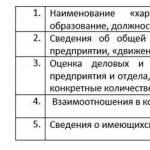There is a strike at the enterprise. Legal status of workers during a strike How to properly organize a strike at an enterprise
The strike at Ford fizzled out. Rabota.ru found out what it’s like to go on strike in Russia according to the law.
At the Vsevolzhsk Ford plant, 2,000 people make 72,000 cars a year. In February the first new Russia strike at a foreign enterprise. A strike is a legal, but difficult to use, tool for protecting one’s rights. It's a shame if you can't avoid it. Prepare well. At Rabote.ru they compiled a short catechism of a labor revolutionary.
Brazilian legs of Russian strike
Perhaps it all began in the land of wild monkeys. In the summer of 2005, the current trade union leader Alexey attended an international trade union conference in Brazil and underwent training at the trade union organization Transnational Information Exchanging. The delegate's acquaintance with advanced colleagues who bravely defended their rights was not in vain.
In the fall of the same year, the management of Vsevolozhsk Ford began having problems with the trade union. “I helped Alexey Etmanov draw up a resolution where we formulated demands for an increase in wages, for their equalization,” says Gennady Trudov, chairman of the Trade Union of Mechanical Engineers of the Russian Federation.” The management did not negotiate, and in November 2005 the workers held an hour-long warning strike. The management did not fully comply with their demands - in particular, for a 30% increase in wages, and in the spring the workers went on strike again. In April 2006, their wages were nevertheless increased, but not by 30%, as the union wanted, but by 14.25-17.5%.
But the strike epic at Ford did not end there. On February 14 this year, workers stopped the conveyor for a day. The main reason for the strike this time was the demand to sign a collective agreement. Among its points are the refusal to work on short-term contracts, recognition of the harmfulness of production and a guarantee of the provision of a job in the event of an occupational disease at work.
Ford management is ready to make some concessions, but the workers are not satisfied with the compromise option. Negotiations between management and workers are ongoing. The union is considering the proposal of the administration, which has expressed its readiness to conclude a collective agreement from March 1. According to the press secretary of Vsevolzhsk Ford, Ekaterina Kulinenko, the plant’s workers are now working as usual.
When can you go on strike?
Strike - legal way“achieve mutual understanding” with management who ignore the wishes of employees. According to the Labor Code, the cause of a labor dispute may be non-payment of wages, a requirement to perform work not agreed upon in advance, irregular working hours, etc.
The right to strike as a way to resolve a collective labor dispute is enshrined in Article 37 of the Constitution of the Russian Federation. Lockout, or dismissal of workers participating in a collective labor dispute or on strike, is illegal (). On the contrary, management is obliged to provide premises where strikers can hold meetings, and has no right to refuse negotiations with them.
But the right to strike does not always apply. If its implementation poses a threat to the life and health of people, the defense of the country and the security of the state, then the strike is illegal (). True, it is unlikely that stopping the production of Focuses will threaten the lives of car enthusiasts. Ford plant workers have the right to go on strike in full.
How to organize a strike correctly
IN Labor Code More than one chapter is devoted to strikes. Its main stages are as follows:
- Make demands to the employer.
- Wait for his answer. If the demands are refused, a labor dispute arises.
- Organize a conciliation commission (representatives of the employer and employees).
- If it is not possible to reach an agreement, the resolution of the dispute continues with the participation of a mediator and (or) in labor arbitration (labor arbitration is created by the parties to the collective labor dispute and the Service for Settlement of Collective Labor Disputes labor disputes).
- If the outcome is still unsatisfactory, workers can go on strike. The decision to declare a strike is made at a general meeting. The employer is notified of a strike 10 days in advance. calendar days.
An “advanced” striker, when organizing a strike, takes into account the terms, procedures and requirements provided for, otherwise the strike risks being illegal. For example, a decision on a strike can be made only if at least half of the workers present at the meeting vote for it (or if there are signatures from more than half of the workers in support of the strike). By the way, the court declared the strike at Ford illegal because the workers made the decision not at a general meeting, but by voting in shifts. The workers say management did not provide them with space for the meeting.
But the “illegal” Ford strike took place. According to Elena Gerasimova, the workers had 10 days, prescribed by law, during which the court decision could (and was) challenged in the Supreme Court of Russia, and the strike cannot be considered illegal until there is a decision from the Supreme Court. (An illegal striker can, by law, be fired.)
How to “extinguish” a strike
In the spring of 2006, Ford workers went on strike “Italian style” (they worked strictly “according to the norm” stipulated by the labor contract, ignoring overtime work). The plant administration tried to prevent a reduction in production by hiring 200 freelancers. Thus, the prudent management “extinguished” the strike. Alexey Etmonov, in an interview with the Russian Courier newspaper, noted that in Brazil, “despite unemployment,” “freelance workers do not harm the strikers, because their solidarity is not an empty phrase.”
We decided to organize a strike or take part in it. Yes, there are no questions... However, before you decide to take such actions, you should know that they are regulated by the norms of the current labor legislation. And there the procedure for holding a strike and declaring it illegal is clearly outlined. So, what do you need to know?..
What is a strike?
We are talking about the idea of voluntary temporary refusal of workers to fulfill their official (official) duties. It can be complete or partial, and is aimed at resolving a collective labor dispute that has arisen . Previously, the Supreme Court of the Russian Federation indicated that when carrying out such an action, two rules must be observed: mandatory conditions strikes.
One of them is a collective labor dispute. That is, when the employer and the team have certain disagreements regarding a range of issues. These include establishing and introducing changes to working conditions. Claims may also arise regarding the conclusion and execution of collective agreements and changes in their terms. Moreover, in the case when, when adopting internal acts, the employer does not take into account the opinion of a trade union organization or other representative body.
It is important to understand that employee disagreement with separate conditions labor does not indicate the existence of a collective dispute between them and the employer. In order for it to be legally recognized, it will be necessary to receive written demands from employees in accordance with the provisions of the Labor Code of the Russian Federation.
To give the appearance of a strike to a voluntary refusal to work, the established procedure must be followed. Otherwise, actions may be interpreted as truancy. We should not forget that it is prohibited to force people to participate in a strike. For this, as well as for refusing it, the legislator established both disciplinary and administrative liability.
For example, refuse to perform official duties allowed only for a certain time. As soon as the strike ends, the workers who took part in it must begin work. In this case, it does not matter whether they succeeded in achieving their demands.
Please note that even if the mandatory signs of a strike, it may be declared illegal. What cases are we talking about?
First of all, it is prohibited to go on strike when a state of war, a state of emergency or special measures is declared. This is prohibited for military personnel and members of other organizations (formations) created to ensure the defense and security of Russia, conduct search and rescue, fire fighting, prevention and liquidation emergency situations, natural Disasters.
Employees are deprived of the right to strike law enforcement, ambulance stations and employer representatives, etc.
It is also prohibited to organize and conduct a strike in violation of the procedures and deadlines established by law; if less than half of the meeting participants supported the decision; the employer was not notified within five days of the start of the strike.
How to go on strike
The Labor Code of the Russian Federation spells out everything: how to organize a strike and how to carry it out. For those who don't know, we'll tell you.
First of all, you should worry about preliminary activities. Thus, the preliminary body or individual employees must put forward their written demands, and the employer must accept them for consideration. After this, the latter is given two working days to respond. During this time, a conciliation commission must also meet.
You can declare a strike immediately after the conflict could not be resolved after conciliation procedures or the parties refused to fulfill the agreement.
How is a temporary refusal to work announced?
The current legislation provides for a procedure for declaring a strike. First, you need to convene a meeting of workers, the agenda of which includes the issue of holding a strike. The employer must provide a place for it. For refusal to do this, a fine of one to three thousand rubles is provided. It also happens that the team does not have the opportunity to gather, then you can collect signatures from more than half of the organization’s employees (50 percent + 1 vote).
The employer must be notified in writing that there will be a refusal to work five working days in advance (if the union decides to declare a strike, this time increases to one week). Upon receipt of such notice, the employer is obliged to notify government agency, whose responsibilities include the settlement of collective labor disputes.
At the negotiating table
The problems that caused the strike must be resolved somehow. This usually happens during negotiations between the employer and the organizers of the action. During this period, each party has both specific rights and obligations. Let's talk about those and others.
The legislator has provided certain standards of conduct for striking employees. So, along with the temporary cessation labor activity the necessary minimum of work will still have to be done. It is determined by the employer, trade union and local authorities.
During a strike, it is prohibited to bring workers to disciplinary liability, but not if its conduct is declared illegal. For example, if an employer decides to dismiss someone, he faces a fine of 4,000 - 5,000 rubles.
What should the employer do during this period? First of all, ensure security public order, safety of both one’s own and the property of subordinates. Do not allow equipment to stop when this could endanger the life and health of people.
Accrue wages not necessarily while work is suspended. But those who perform the mandatory minimum work will have to be paid in any case.
They went on strike...
The final stage of any action is its termination. It is worth noting that the current legislation does not provide for an indication of the duration of refusal to work in the event of a strike. Therefore, it can be as long as possible, and ends after the parties to the conflict reach a certain agreement, or the workers decide to abandon the strike as pressure on the employer.
If a strike is organized illegally, and a decision on this can only be made by a court, workers can be fired, as well as recovery from them for losses caused to the employer.
In accordance with Part 3 of Art. 409 of the Labor Code of the Russian Federation, the participation of workers in a strike is voluntary; no one can be forced to participate or refuse to participate in a strike. Persons who force workers to participate or refuse to participate in a strike bear disciplinary, administrative, and criminal liability in the manner prescribed by federal laws. Representatives of the employer do not have the right to organize a strike or participate in it. Violation of this prohibition is grounds for disciplinary action.
Bringing to disciplinary liability persons who force participation in a strike or refusal to participate in it is a right, and not an obligation, of authorized representatives of the employer. In accordance with Art. 5.40 of the Code of the Russian Federation on Administrative Offences, coercion to participate or refuse to participate in a strike through violence or threats of violence or using the dependent position of the coerced person entails the imposition of an administrative fine on citizens in the amount of 5 to 10 times the minimum wage, for officials organizations, regardless of their organizational and legal forms and form of ownership - in the amount of 10 to 20 times the minimum wage. Bringing to this type of administrative liability when identifying the listed offenses is the responsibility of authorized persons of the state labor inspectorate, who draw up a protocol on administrative offense and send it to the magistrate, and in his absence to the district (city) court. When committing criminal acts, in particular causing bodily harm to workers in order to force them to participate in a strike or refuse to participate in a strike, the perpetrators may be brought to justice criminal liability under the relevant articles of the Criminal Code of the Russian Federation, providing for liability for causing bodily harm. Thus, one of the legally significant circumstances that must be verified when assessing the legality of a strike is the voluntary participation of workers in it.
In accordance with Part 3 of Art. 414 of the Labor Code of the Russian Federation, during the strike, the workers participating in it retain their place of work and position. Let us recall that Art. 59 of the Labor Code of the Russian Federation allows the employer to conclude a fixed-term employment contract to replace a temporarily absent employee, who, in accordance with the law, retains his place of work. Consequently, the legislation does not prohibit the employer, during the strike period, from accepting other workers into the workplaces of the workers participating in it under a fixed-term employment contract, which must be terminated after the workers who took part in the strike leave. The presence of such an option reduces the potential of workers to use a strike as a legitimate way to satisfy collective demands. But at the same time, workers are not deprived of the opportunity to include in the subject of a collective labor dispute a requirement that the employer refuse to conclude fixed-term employment contracts with workers hired to work at the workplaces of persons participating in the strike. The conclusion of such an agreement improves the situation of workers in comparison with the law, which is allowed by Art. 9 Labor Code of the Russian Federation. The presence of such an agreement deprives the employer's representatives of the opportunity to use other workers at the workplaces participating in the strike. In this connection, the effectiveness of the strike increases.
Based on Part 4 of Art. 414 of the Labor Code of the Russian Federation, the employer has the right not to pay employees the average wage during their participation in the strike. An exception to this rule are employees who ensure the implementation of mandatory minimum works (services). However, a collective agreement, agreement or agreements reached during the resolution of a collective labor dispute may provide for the preservation of the average wage for employees during their participation in a strike. Therefore, one of the collective demands formed by workers may be to impose on the employer the obligation to maintain the average wage for workers participating in the strike. The conclusion of such an agreement with the employer also complies with current legislation.
After concluding such an agreement, workers who took part in the strike have the right to receive average earnings for the period of its conduct. This right can be exercised by employees individually in writ or lawsuit proceedings.
Workers who are not participating in the strike, but due to its conduct are deprived of the opportunity to perform their work and who have declared in writing the start of downtime, have the right to payment for downtime in accordance with Art. 157 of the Labor Code of the Russian Federation in the amount of at least two-thirds of their average earnings, since downtime in the case under consideration arises for reasons that depend on the employer, whose representatives, by concluding appropriate agreements, can terminate a collective labor dispute.
Based on Part 6 of Art. 414 of the Labor Code of the Russian Federation, the employer can carry out temporary transfer to other jobs for workers not taking part in the strike. In accordance with Part 1 of Art. 74 of the Labor Code of the Russian Federation, a transfer is allowed to replace a temporarily absent employee participating in a strike. The duration of such a transfer should not exceed one month during a calendar year (from January 1 to December 31).
In Part 7 of Art. 414 of the Labor Code of the Russian Federation states that a collective agreement, agreement or agreements reached during the settlement of a collective labor dispute may provide for a more preferential procedure for payments to employees who did not take part in the strike compared to the law. For example, maintaining the average work rate during downtime due to a strike, increased payment for work (services) performed in order to ensure the minimum approved in accordance with the law necessary work(services). The conclusion of such an agreement also improves the situation of workers compared to the law, which corresponds to Art. 9 Labor Code of the Russian Federation. After concluding such an employment contract, employees have the right to receive payments that are higher than those required by law, with the corresponding obligation of the employer to make such payments. This right can also be exercised in writ or lawsuit proceedings, as well as by applying to the CCC.
In Art. 415 of the Labor Code of the Russian Federation prohibits a lockout, that is, the dismissal of workers at the initiative of the employer in connection with their participation in a collective labor dispute or strike. Carrying out such dismissal is a violation of labor legislation, for which authorized representatives of the employer may be held administratively liable. In Part 2 of Art. 405 of the Labor Code of the Russian Federation establishes the rule that representatives of workers and their associations participating in the resolution of a collective labor dispute during the period of its resolution cannot be subject to disciplinary action, transferred to another job or dismissed at the initiative of the employer without the prior consent of the body that authorized them to represent them. Thus, bringing these persons to disciplinary liability, their transfer to another job, dismissal at the initiative of the employer can only take place with the prior consent of the trade union body or the general meeting (conference) of the organization or structural unit in which the collective labor dispute is ongoing, which authorized the said persons to representation during its administration. The absence of such consent is an unconditional basis for declaring the order (instruction) to bring disciplinary liability, transfer, or dismissal of the named persons on the initiative of the administration as illegal state inspection labor or court. After which the employee has the right to demand not only compensation for material losses, but also compensation for moral damage.
In accordance with Part 1 of Art. 414 of the Labor Code of the Russian Federation, an employee’s participation in a strike cannot be considered a violation labor discipline, as well as grounds for termination employment contract. In Part 2 of Art. 414 of the Labor Code of the Russian Federation, it is prohibited to apply disciplinary measures to employees participating in a strike. However, on the basis of Part 6 of Art. 413 of the Labor Code of the Russian Federation, after a court decision declaring a strike illegal has entered into legal force and a copy of it has been delivered to the body leading the strike, workers are obligated to start work the next day. Failure to fulfill this obligation may become the basis for bringing employees to disciplinary liability. Thus, workers cannot be held accountable for the period of the strike that elapsed before the court decision declaring it illegal entered into legal force. That is, the basis for disciplinary action is failure to comply with a court decision that has entered into legal force declaring a strike illegal. A decision to declare a strike illegal may be made by the court of the relevant entity Russian Federation, it comes into force upon the expiration of the ten-day period for a cassation appeal or its leaving in force by the Judicial Collegium for Civil Cases of the Supreme Court of the Russian Federation after consideration of the cassation appeal. A decision that has entered into legal force must be served not only on the body leading the strike, but also be brought to the attention of the employee who is held accountable for its failure to comply. The absence of evidence confirming that the employee has received a binding court decision, on the basis of which he must begin work, does not allow him to prove his guilt in committing a disciplinary offense. In turn, the absence of a disciplinary offense does not allow disciplinary measures to be applied to the employee. In connection with the above, we can highlight the following legally significant circumstances, the proof of which makes it possible to bring an employee to disciplinary liability for participating in an illegal strike: 1) the presence of a decision to declare the strike illegal that has entered into legal force; 2) bringing this decision to the attention of the body leading the strike; 3) informing the employee subject to disciplinary liability of information about the need to start work in connection with a court decision declaring the strike in which he is taking part illegal.
In accordance with Part 7 of Art. 413 of the Labor Code of the Russian Federation, the court has the right, if there is an immediate threat to the life and health of people, to postpone a strike that has not started for up to 30 calendar days, and to suspend a strike that has begun for the same period. A court ruling to postpone or suspend a strike may be made when an authorized representative of the employer initiates a civil case to declare the strike illegal and submits a petition to postpone or suspend the strike. This determination, as preventing the further advancement of a collective labor dispute, can be appealed in cassation by filing a private complaint. Failure by workers to comply with a ruling that has entered into legal force to postpone or suspend a strike is the basis for a decision to declare it illegal. Introduction this decision into legal force and its failure to comply may become the basis for bringing employees to disciplinary liability if the considered legally significant circumstances are proven. However, at the same time, the circumstances set out in the definition that served as the basis for declaring a strike illegal must follow from the content of substantive norms and be confirmed by a set of relevant, admissible, reliable and sufficient evidence.
In Part 8 of Art. 413 of the Labor Code of the Russian Federation, the Government of the Russian Federation is given the right to suspend a strike until the issue of its legality is resolved by the court for a period of up to ten days in cases of particular importance for ensuring the vital interests of the Russian Federation or its individual territories. Consequently, the decision of the Government of the Russian Federation to suspend the strike must contain reference to the specific vital interests of the Russian Federation or its constituent entities that are affected by the strike that has begun. The absence of such a reference allows us to demand that this decision be declared illegal in Supreme Court RF. Failure to comply with the legal decision of the Government of the Russian Federation to suspend a strike may also become a reason for it to be declared illegal in court. However, the basis for bringing workers participating in a strike to disciplinary liability can only be a court decision that has entered into legal force declaring the strike illegal.
Thus, disciplinary liability of workers may occur after the continuation of an illegal strike recognized by a court decision that has entered into legal force.
Textbook " Labor law Russia" Mironov V.I.
- Labor law
Keywords:
1 -1
2008-12-23
1. The most important thing is to get rid of the victim complex, which has been developed for centuries among Workers by those in power. A slave ceases to be a slave at the moment when he ceases to look at himself through the eyes of the slave owner, and ceases to perceive the opinion of the authorities about himself as his own.
2. The only therapy that cures victim complexes is an offensive protest that frightens those in power, economic and political blackmail of the Capitalist system in their own class interests.
3. The strike must be unexpected for the owners of the enterprise and management. Under no circumstances should you notify your superiors in advance or threaten them with a strike. Otherwise you won't achieve anything.
4. It is best to start a strike at the most inconvenient and inappropriate moment for the management and owners of the enterprise (to disrupt an important order or work, the termination of which would entail the shutdown of neighboring areas, workshops, and enterprises). Fulfilling the demands of the strikers will be more profitable for the owners of the enterprise than paying penalties to customers and losing profits or causing instability in the region.
5. The more Workers (site, workshop, enterprise) are involved in the strike, the greater the likelihood of success, the greater the results that can be achieved.
6. Those who prepare a strike in advance, during its preparation, should not attract the attention of their superiors. In the beginning there was a word. Talk to your work colleagues.
7. If things go well, you need to hold a General Meeting, at which it will be necessary to decide what demands will be put forward and write them down.
8. Bosses should not be present when discussing the progress of the strike or the conditions put forward. Bosses are invited to negotiations when the position has already been agreed upon and accepted by the workers.
9. All negotiations with management are conducted only by the General Meeting of Workers at the workplace. No negotiations in the bosses' offices! When workers are together, they are strength.
10. If bosses refer to the law on strikes or make threats, there is no need to pay attention to it. Laws are written by the bourgeoisie, and they are passed by deputies bought by the bourgeoisie. Anyone who plays by the rules of those in power has already lost.
11. Bosses and owners will ask you to “get into their position” and “understand their problems.” They rob - by deceiving and cheating, they fire and humiliate, and never enter into the position of workers. Why then put yourself in the position of bosses and owners? Who puts himself in the position of his enemy?
12. For greater efficiency, political demands are put forward: “The government resigns,” “Down with the government,” or block the nearest major road or highway.
13. You need to invite the media to inform them of your demands so that your strike receives greater resonance in society.
14. The more workers take part in the strike, the greater the fear of those in power, the sooner your demands will be fulfilled. Those in power and bosses understand only one language - the language of force.
RESISTANCE - SELF-ORGANIZATION - SELF-GOVERNMENT - FREEDOM
| +3 |
| Comments(total 23) | |
|
|
|
|
|
|
Hide
Hide
Hide
Hide
Hide
Hide
Hide
Hide
Hide
Hide
Hide
Step-by-step instruction
A strike is sometimes the only way to achieve “mutual understanding” with management that ignores the wishes of its employees.
The employer does not have the right to refuse negotiations with the organizers of the strike.
You will need:
- general meeting team;
- written requirements to the employer;
- creation of a conciliation commission;
- protocol of disagreements;
- written notification to the employer.
Instructions
1 — The right to strike is enshrined in Article 37 of the Constitution of the Russian Federation as a legal means of protecting one’s rights and interests. Moreover, Art. 415 of the Labor Code says that the dismissal of workers participating in this collective labor dispute is illegal. It is also illegal to force management to abandon a strike. Moreover, the enterprise administration is obliged to provide strikers with a special room for holding meetings.
2 — But before organizing a strike, hold a general meeting of employees and formulate demands on the enterprise administration. Your claims must be clear and specific. For example, increase labor safety, index wages, etc.
3 — Put your demands in writing to the employer so that they have legal force. Wait for his response. He must respond to you within three days.
4 — If you refuse to make concessions, organize a conciliation commission consisting of representatives of the employer and employees. She must resolve all your differences within five days. If reconciliation fails, a special mediator from the Ministry of Labor will settle collective disputes. In the event that he is also unable to do this, a so-called protocol of disagreements is signed between the warring parties. Labor arbitration is also involved in resolving the conflict.
5 — If the conflict is not resolved, hold a general meeting of the team and announce the long-awaited strike. At least half of those present must vote for it. Record all information about the meeting in the minutes.
6 — 10 days before the strike, notify the employer about the strike in writing. State the date and time of the strike, the expected number of participants and duration. By the way, the law does not determine how many people can take part in a strike. This could be the entire team, or one service or department.
note
Pay attention to everything legal subtleties organizing a strike, otherwise it may be declared illegal and the strikers will lose their jobs.
Useful tips
Please also note that not all categories of employees are allowed to go on strike. They are prohibited for the military, law enforcement officers and the FSB, emergency doctors, that is, those persons whose work is related to the safety of people, the protection of their health and the vital interests of society.
Here is what the law enforcement officers themselves explain about this:
The Leningrad Region Prosecutor's Office explained to workers and employers how to go on strike correctly. The supervisory agency has published instructions for potential strikers on its website. The publication talks about when you need to warn your employer about a protest. It is also about how the decision to go on strike is made. Activists were also reminded of the existence of penalties for illegal strikes. The prosecutor's office chose not to name specific sanctions:
Let us add that for committing a disciplinary offense (non-fulfillment or improper fulfillment by an employee through his fault of the duties assigned to him labor responsibilities) the employer has the right to apply one of three disciplinary sanctions. This is a reprimand, reprimand and dismissal on appropriate grounds, according to Article 192 of the Labor Code of the Russian Federation. Fines under Article 20.26 of the Code of Administrative Offenses reach 2.5 thousand rubles.
Let us recall that the legal basis for the activities, functions and powers of the prosecutor’s office are enshrined in Federal Law No. 2202-1 of January 17, 1992.
Materials used from the sites: http://www.kakprosto.ru and http://www.kadis.ru/
If you find an error, please highlight a piece of text and click Ctrl+Enter .





